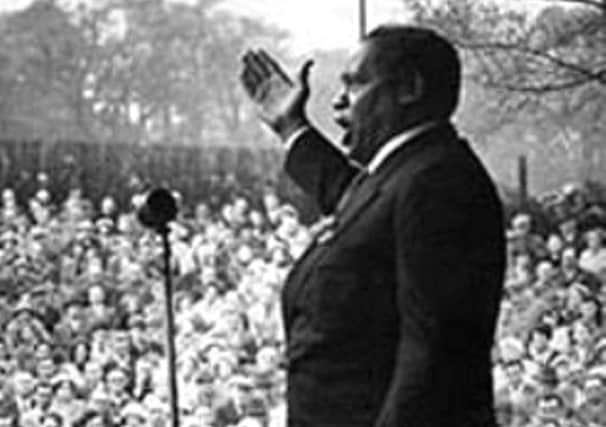Celebrating the life and trials of Paul Robeson


They welcomed a global celebrity in the form of Paul Robeson.
The sport, movie and singing star had a long and proud record of social and political activism, a record that saw him black-listed and shunned in America.
Advertisement
Hide AdAdvertisement
Hide AdInspired by tales of Red Clydeside, Robeson accepted the STUC’s invitation to join them in marking International Workers Day.
The annual march had been taking place in the city since the 1890s, when crowds of up to 100,000 would march to Glasgow Green, to party, picnic, and listen to political speakers.
Robeson proved a huge hit in Glasgow, and, on arrival at the Queen’s Park Bandstand, he serenaded the crowd.
There was only one song he could have sung, ‘Ol’ Man River’, the lyrics of which work as well for the Clyde as they do for the Mississippi.
Ol’ man river,
Dat ol’ man river
He mus’know sumpin’
But don’t say nuthin’,
He jes’keeps rollin’
Advertisement
Hide AdAdvertisement
Hide AdAn appropriate choice for the son of a slave at a city whose river brought riches reaped from slavery.
When the song finished the crowd rose to give him a standing ovation before he stood for two hours signing autographs.
This was one of the first appearances Robeson had made outside the US since his passport had been revoked because of his left-wing beliefs.
Born in 1898, Robeson was a son of an escaped slave and was the most famous and widely respected African-American man in the world, having thrilled thousands with his commanding presence and magnificent deep baritone voice on the Broadway stage and Hollywood screen.
Advertisement
Hide AdAdvertisement
Hide AdAt the height of his fame, Robeson made the decision to become a political artist.
One of the earliest civil rights activists decades before the movement mobilised, Robeson was also an outspoken opponent of imperialism, capitalism and fascism and a vocal advocate for workers’ rights and international peace.
Robeson regained his passport in 1958, but despite several attempts to rebuild his career, the damage was permanent.
He was shunned even by Black leaders, Coretta Scott King – Martin Luther King Jr’s widow – would later admit that Robeson had been “buried alive”.
Advertisement
Hide AdAdvertisement
Hide AdHis mental and physical health swiftly deteriorated, but he remained unrepentant and true to his beliefs to the end.
Robeson’s own words – spoken at a ‘Save Spain’ anti-fascist rally at the Royal Albert Hall in 1937 – serve as his enduring epitaph:
“The artist must take sides. He must elect to fight for freedom or slavery. I have made my choice. I had no alternative.
“The history of the capitalist era is characterised by the degradation of my people: despoiled of their lands, their culture destroyed … denied equal protection under law, and deprived their rightful place in the respect of their fellows.
Advertisement
Hide AdAdvertisement
Hide Ad“Not through blind faith or coercion but conscious of my course, I take my place with you.”
Paul Robeson died on January 23, 1976, and almost 60 years later, the memorable event is to be marked where Robeson performed.
Call Mr Robeson! celebrates the life and trials of Mr Paul Robeson.
With a special introduction by Lost Glasgow’s Norry Wilson and local musicians, this event looks at Glasgow’s history of social justice activism as context for Tayo Aluko’s award-winning one man performance documenting the life of Paul Robeson.
Advertisement
Hide AdAdvertisement
Hide AdThis roller-coaster journey through Robeson’s remarkable and eventful life highlights how his pioneering and heroic (but largely forgotten) political activism led many to describe him as the forerunner of the civil rights movement.
It features much fiery oratory and some of his famous songs, including a dramatic rendition of Ol’ Man River.
The event at Queen’s Park takes place on Friday, May 3; 6.30-10pm. General admission is £11.50. Tickets are available here: Call Mr Robeson!
The event is supported by Glasgow City Heritage Trust, South East Integration Network – Glasgow, Inhouse CIC & Lost Glasgow.